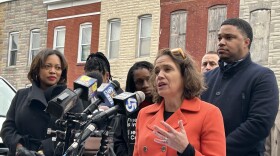There are 13,789 vacant buildings in the city of Baltimore, a figure which the Department of Housing and Community Development (DHCD) said is the lowest in years. But that didn’t stop housing advocates from coming together Wednesday evening to discuss ways to get that number to zero. They spoke at Unity Hall as part of Community Development Week in Maryland.
Panelists offered a few ideas, such as doing away with tax sales, rehabbing whole blocks instead of individual homes and financing the most challenged neighborhoods through non-contiguous bonds, NCB’s.
An entity like the city would sell millions of NCB’s to investors, creating a pool of money. Developers and builders who renovate vacants well would then tap into that pool, making up for the appraisal gap. While risky, it has its merits.
“Every dollar generates $4,” said Joseph “Joe” Meyerhoff II, who proposed the idea. “It has to be used in scale, doesn’t displace anyone and is a thoughtful, community-led process.”

Another idea — albeit controversial — is to set up a ‘reparative fund.’
“The primary people harmed by redlining were Black people,” said Nneka N’namdi with Fight Blight Bmore. “We need funding that is explicitly earmarked for Black people. You'll hear ‘it's against the equal protection clause of the Constitution.’ No, it's not because you are repairing the very specific harms done.”
N’namdi said the capital should come from trimming the Baltimore Police Department’s budget. BPD’s FY2024 budget is $594.5 million, a 2.5% increase over last year. She said the private sector would also need to chime in. “Where are all the banks and corporations with their post George Floyd pledges?”
Lori Graf, the CEO of the Maryland Building Industry Association (MBIA), was not at the forum. In an interview with WYPR, Graf said MBIA looks at the vacant housing problem as an opportunity and would support any ideas that make sense for residents, businesses and other stakeholders. She said, defunding the BPD is not one of them. Though MBIA opposes defunding BPD, they support another idea presented at the panel.
Reverend George Hopkins with Baltimoreans United in Leadership, or BUILD, said more needs to be done about vacant lots. “The goal isn't just to leave vacancy in a different form. The real goal is to rebuild neighborhoods and communities.”
A report released by BUILD earlier this year found vacant homes that have been demolished into vacant lots are costing the city about $500 million dollars.










